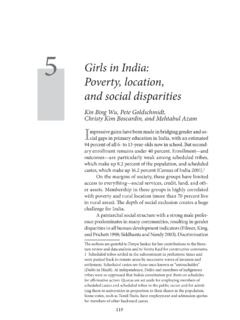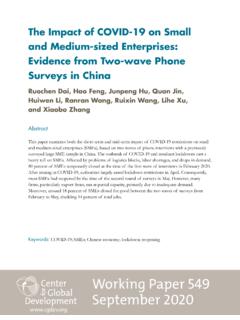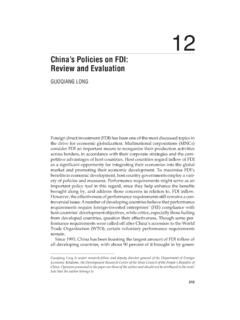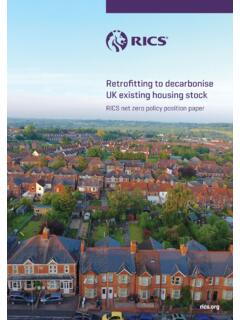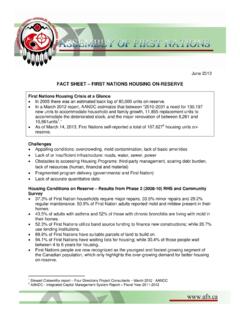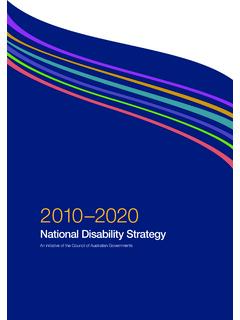Transcription of The Electricity Situation in Ghana: Challenges and …
1 CGD Policy Paper 109 September 2017 The Electricity Situation in ghana : Challenges and OpportunitiesIn the past decade, ghana has experienced severe Electricity supply Challenges costing the nation an average of US $ million in loss of production daily. This Situation has developed even though installed generation capacity has more than doubled over the period; increasing from 1,730 MW in 2006 to 3,795 MW in 2016. The peak Electricity demand only increased by 50 percent during this same period, increasing from 1,393 MW in 2006 to 2,087 MW in 2016. The Electricity supply Challenges can be attributed to a number of factors, including a high level of losses in the distribution system, which is mainly due to the obsolete nature of distribution equipment, as well as non-payment of revenue by consumers.
2 Other factors are overdependence on thermal and hydro sources for Electricity generation and a poor tariff structure, which makes it difficult for the utility companies to recover the cost of Electricity production. In the face of these Challenges , however, ghana could achieve universal access by the year 2020 with an annual electrification rate of about percent. percent of ghana s population had access to Electricity by 2016. Solving ghana s Electricity Challenges would require measures including, but not limited to, diversifying the Electricity generation mix through the development of other hydro power and renewable energy sources for which the country has huge potential, expanding the prepaid metering system to include all public and private institutions, restructuring the tariff regime to ensure utilities can recover their cost of generation, and promoting energy efficiency Nyarko Kumi1 Center for Global Development2055 L Street NWFifth FloorWashington DC 20036202-416-4000 work is made available under the terms of the Creative Commons Attribution-NonCommercial Nyarko Kumi.
3 2017. The Electricity Situation in ghana : Challenges and Opportunities. CGD Policy Paper. Washington, DC: Center for Global Development. University of Energy and Natural Resources, Sunyani, GhanaCGD is grateful for contributions from the Nathan Cummings Foundation and Pritzker Innovation Fund in support of this work. Contents Preface .. 1 Executive Summary .. 2 Abbreviations .. 3 Introduction .. 5 ghana 's Electricity Situation .. 6 The Electricity Access Situation .. 6 The Electricity Demand and Supply Nexus .. 8 The Electricity Generation Mix .. 11 The Structure of ghana s Power sector .. 14 National Stakeholders .. 14 Regional Stakeholders .. 16 International Agencies .. 16 Challenges and Opportunities in ghana s Electricity sector .. 17 Losses in the Electricity Distribution System.
4 18 Tariff Structure .. 19 Diversity in the Electricity Generation Mix .. 20 Energy Efficiency Measures .. 25 Conclusions .. 25 27 1 Preface CGD s work on energy has focused principally on definitions of energy access, data analysis, and the efficacy of international tools available to spur investment in the power sector in developing countries. ghana has been, since independence in 1957, a bellwether country for development trends and this is also true with energy. As one of the first African countries to aggressively pursue electrification, ghana has among the highest access rates on the continent. Yet, the country also suffers from chronic power shortages and has struggled to expand capacity to meet growing demand. To better understand ghana s context and the role of international actors, we commissioned this paper from Ebenezer Nyarko Kumi from the Mechanical and Manufacturing Engineering Department at the University of Energy and Natural Resources in Sunyani, ghana .
5 Kumi outlines the web of Challenges that ghana faces in expanding its power sector and some of the opportunities for national and international actors to contribute toward greater progress. Todd Moss Senior Fellow Center for Global Development 2 Executive Summary ghana s Electricity sector dates back to the Gold Coast era where Electricity supply was mainly from diesel generators owned by industrial establishments including factories and mines as well as other institutions such as hospitals and schools. The sector was revolutionised with the completion of the Akosombo Hydroelectric Power Station which also saw the export of Electricity to neighbouring countries including Togo, Burkina Faso and Benin. Electricity demand has since grown significantly to the point where supply is not enough to meet the demand, resulting in severe power crises over the last decade.
6 In a bid to solve the crisis, a power sector reform was implemented in the late 1990s to open up the Electricity market for private sector participation to help deal with the power crises. ghana committed to universal access to Electricity as far back as 1989 when only 15 20 percent of the population had access to Electricity . The National Electrification Scheme was established to oversee and implement the National Electrification Master Plan which sought to extend Electricity to every part of the country by the year 2020. Through programmes like the Self-Help Electrification Program (SHEP), the scheme has been able to extend Electricity to about percent of the population as of the end of 2016. However, more efforts will be needed to ensure universal access is attained by the year 2020.
7 Demand for Electricity in ghana has increased by about 52 percent over the last decade (2006 2016) whiles installed generation capacity has more than doubled over the same period. In spite of this, the country still suffers from persistent power supply Challenges . This Situation can be attributed to the fact that most of the installed generation facilities are not available for generation due to fuel supply Challenges . ghana s Electricity sector has been heavily dependent on the Akosombo Dam which has seen water levels drop consistently below acceptable operational levels. In recent times however, significant amounts of thermal generation sources running on mostly natural gas have been introduced into the sector . The problem with these sources is that supply of natural gas by the West African Gas Pipeline (WAGP) has been very unreliable.
8 Other Challenges plaguing the sector include high levels of distribution losses, lack of revenue due to the non-payment of bills and also poor tariff structure, which makes it difficult for the power utilities to make significant investments to improve the sector due to financial constraints. Opportunities, however, remain in the sector for the introduction of renewable energy sources into the generation mix, seeing that the country has potential for solar power generation and other renewable energy sources. In light of this, the necessary regulatory frameworks have been provided notable among these is the passage of the Renewable Energy Act in 2011. 3 Abbreviations ACEP African Center for Energy Policy AfDB African Development Bank Group BPA Bui Power Authority CIDA Canadian International Development Agency CSO Civil Society Organisation DFO Distillate Fuel Oil EC Energy Commission ECG Electricity Company of ghana ECREEE ECOWAS Centre for Renewable Energy and Energy Efficiency ERERA ECOWAS Regional Electricity Regulatory Authority GDP Gross Domestic Product GEDAP ghana Energy Development and Access Programme GEF Global Environment Facility GHG Green House Gas GoG Government of ghana GRIDCo ghana Grid Company GWh Giga Watt Hour HFO Heavy Fuel Oil IEA International Energy Agency IPP Independent Power Producer IRENA International Renewable Energy Agency ISSER
9 Institute of Statistical, Social and Economic Research kV Kilo Volt kWh Kilo Watt Hour LCO Light Crude Oil LNG Liquified Natural Gas MCC Millenium Challenge Corporation MOFEP Ministry of Finance and Economic Planning MOP Ministry of Power Mscf Million Standard Cubic Feet MW Mega Watt NED Northern Electricity Department NEDCo Northern Electricity Distribution Company NES National Electrification Scheme NG Natural Gas NITS National Interconnected Transmission System PURC Public Utilities Regulatory Commission PWD Public Works Department SHEP Self Help Electrification Programme T & D Transmission and Distribution UNEP United Nations Environment Programme USAID United States Agency for International Development VALCO Volta Aluminum Company 4 VRA
10 Volta River Authority WAGP West African Gas Pipeline WAGP Co West African Gas Pipeline Company WAPP West Africa Power Pool 5 Introduction Electricity is one of the major determinants of the economic prosperity of any country. It plays a significant role in undertaking daily activities from cooking, lighting, heating to powering machines in the industrial sector . Electricity is also essential for quality healthcare delivery, education, transport, effective communication, mineral exploration and many more; serving as the building block on which every sector of a nation s economy thrives. This emphasizes how crucial and indispensable Electricity is for human existence in the 21st century. ghana s Electricity sector dates back to the colonial days of the Gold Coast, where Electricity supply was mostly from isolated diesel generator plants dispersed across the country.

